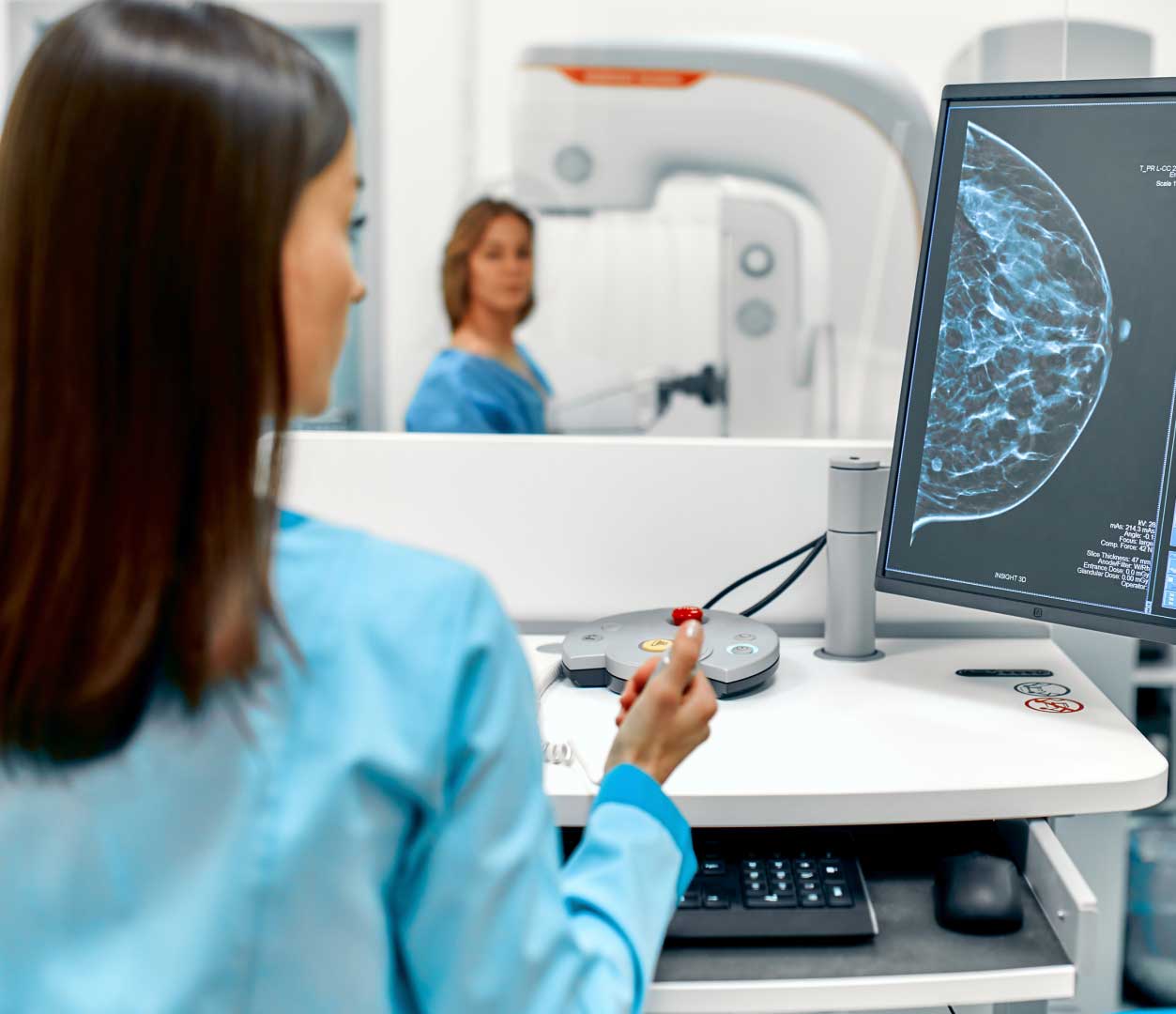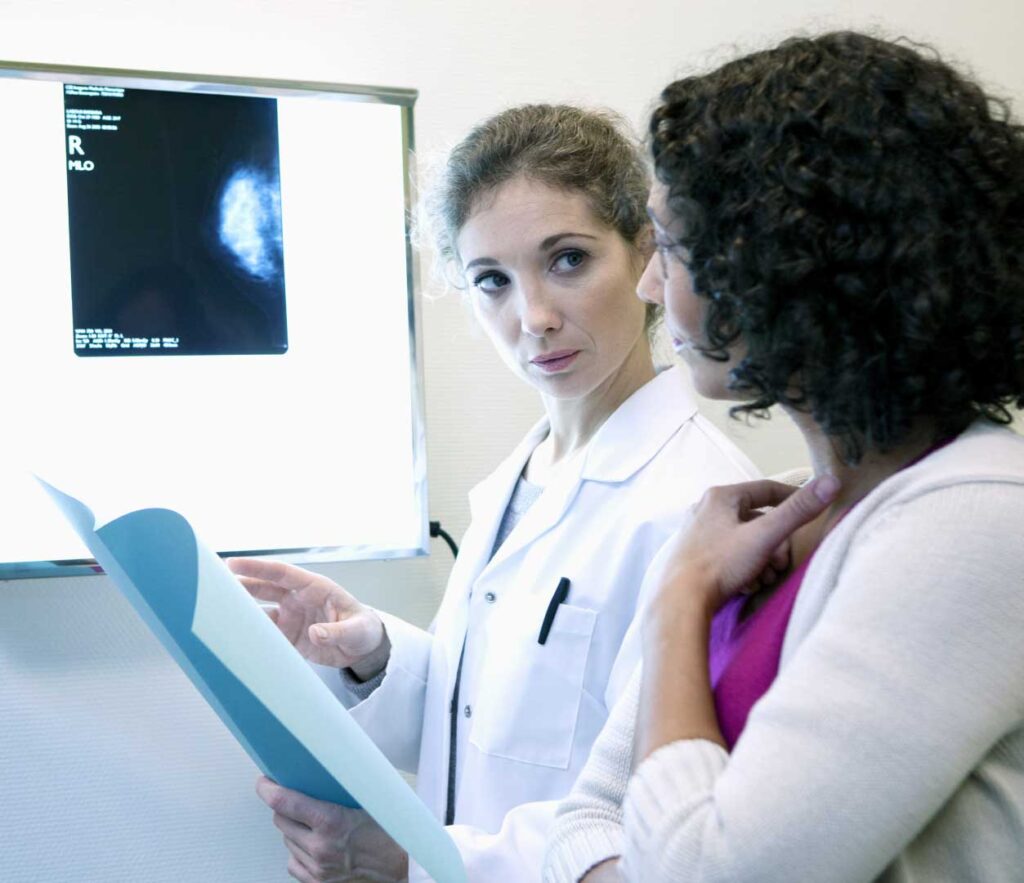Thyroid Cancer Treatment
In Hyderabad
Get Clinically-Successful Treatments for Thyroid Cancer By Specialised Doctors at Onco Cancer Centres in Hyderabad
- Best-In-Class Services & Quality Treatments
- Same day Investigation + Treatment Initiation
- Dedicated, Advanced Oncology Facility
- Affordable Diagnostics
- Low-cost Advanced Treatment Options With Zero-cost EMI

What is Thyroid Cancer?
Thyroid cancer is a type of cancer that develops in the thyroid gland, which is located in the front of the neck, just below the larynx (voice box). The thyroid gland produces hormones that regulate metabolism, heart rate, and body temperature. Thyroid cancer occurs when cells in the thyroid gland grow and divide uncontrollably, forming a tumour. There are several types of thyroid cancer, but the most common types are papillary thyroid cancer and follicular thyroid cancer. Treatment for thyroid cancer usually involves surgery to remove the thyroid gland, followed by radioactive iodine therapy to destroy any remaining cancer cells. In some cases, radiation therapy or chemotherapy may also be used. The prognosis for thyroid cancer is generally good, with a high survival rate, especially when detected early and treated promptly.
Our Team of Top Thyroid Cancer Specialists In Hyderabad

Dr. Amit Jotwani
CoFounder, CMO, Chief Oncologist
Dr. Shikhar Kumar
Consultant Medical Oncologist
Dr. Rakesh Shankar Goud
MBBS, DNB-Radiation Oncology
Dr. Abid Ali Mirza
Surgical Oncologist
Dr. M A Suboor Shaheerose
Medical Oncologist
Dr. Amit Jotwani
CoFounder,CMO,Chief Oncologist
MD (Radiotherapy), FHPRT, SBRT(Netherlands), AMPH

Dr. Shikhar Kumar
MD, DNB,DM – Medical oncology, ECMO
MD (Radiotherapy), FHPRT, SBRT(Netherlands), AMPH

Dr. Rakesh Shankar Goud
MBBS, DNB-Radiation Oncology
MD (Radiotherapy), FHPRT, SBRT(Netherlands), AMPH
Take Benefits of Our Onco Cancer Centres
- Multi-disciplinary care
- Hassle-free consultation
- Doctor consultation for more than 30 minutes
- No IP charges for chemotherapy
- Advanced technology like scalp cooling, leg massager at the center
- Tele-consultations available with oncologists across the country
- Second opinions offered free of cost
- Complementary diet plans
- Discharge process Less than 1 hour

Know About Thyroid Cancer -Treatment and Procedures
Signs and Symptoms of Thyroid Cancer

- A lump or swelling in the neck
- Pain in the neck
- Hoarseness or voice changes
- Difficulty swallowing or breathing
- Swollen lymph nodes
- Changes in thyroid function
Consult an Oncologist and Get Examined
Diagnostic Tests for Thyroid Cancer in Hyderabad
Ultrasound: This is often the first test performed to evaluate a thyroid nodule or lump. Ultrasound uses sound waves to create images of the thyroid gland, and can help determine the size and characteristics of a nodule.
Fine-needle aspiration biopsy: This test involves using a thin needle to collect cells from the thyroid nodule for examination under a microscope. It can help determine if the nodule is cancerous or benign.
Thyroid function tests: Blood tests can help determine if the thyroid gland is producing too much or too little thyroid hormone. Abnormal thyroid function can be a sign of thyroid cancer.

Radioactive iodine scan: This test uses a small amount of radioactive iodine to create images of the thyroid gland. The radioactive iodine is absorbed by the thyroid cells, allowing doctors to see if any cells are overactive or abnormal.
CT scan or MRI: These imaging tests can provide more detailed images of the thyroid gland and surrounding tissues, and can help determine if cancer has spread to other parts of the body.
Get discount on Diagnostic tests
Advanced Procedures for Thyroid Cancer Treatment in Hyderabad
There are several advanced procedures available for the treatment of thyroid cancer, depending on the stage and extent of the cancer. The most common treatment is thyroidectomy, which involves the surgical removal of the thyroid gland. Radioactive iodine therapy is also used, which involves taking a dose of radioactive iodine to destroy cancer cells. External beam radiation therapy, chemotherapy, targeted therapy, and immunotherapy are other treatment options available for thyroid cancer. However, the choice of treatment will depend on factors such as the type and stage of the cancer, and the overall health of the patient.
Talk To Our Expert Oncologist
Cost of Thyroid Cancer Treatment in Hyderabad
This cost of thyroid cancer treatment may vary depending on hospital facilities, medical expertise, pre-treatment costs (consultations, blood tests, and scans), type and duration of treatment you are receiving, and post-treatment costs (follow-up consultation for periodic checks including tests, scans, rehabilitation, and medications).
On average, the cost of thyroid cancer treatment in Hyderabad ranges between INR 95,000 to INR 3,40,000.
Get Best Quote For Thyroid Cancer Treatment in Hyderabad
Clinical Experience & Patient Stories
We are always pleased to hear positive feedback about Onco Cancer Centres. Here are some of the testimonials we’ve received from our Patients
Chandra Kishore
Mahesh P
Vihar B. Ghutugade
nagaraju mogulla
Namit Singh
Santosh Kumar
Hari Santhosh kumar
Anil Kawale
Frequently Asked Questions on Thyroid Cancer Treatment in Hyderabad
Thyroid cancer in its early stages may not show any noticeable symptoms, but there are some early warning signs to watch out for. The most common sign is a lump or swelling in the neck, which may be painless or tender. Pain in the front of the neck or throat, hoarseness or voice changes, and difficulty swallowing or breathing can also be signs of thyroid cancer. However, these symptoms can also be caused by other conditions, so it is essential to seek medical attention if any of these signs are experienced. Diagnostic tests like an ultrasound or fine-needle aspiration biopsy may be ordered by a doctor to confirm or rule out the diagnosis of thyroid cancer.
Most types of thyroid cancer can be effectively treated, and the outlook for patients with thyroid cancer is generally good, especially if the cancer is detected early. The type of thyroid cancer and its stage are important factors in determining the prognosis and the appropriate treatment options. The most common types of thyroid cancer include papillary, follicular, medullary, and anaplastic thyroid cancer. Among these types, papillary and follicular thyroid cancers are the most common, and they are also the most curable.
The exact cause of thyroid cancer is not fully understood, but several risk factors have been identified that may increase a person’s chances of developing this type of cancer. The main cause of thyroid cancer is changes in the DNA of thyroid cells, which can cause the cells to grow and multiply uncontrollably, leading to the formation of a tumour.
Some groups of people are more likely to develop thyroid cancer than others. Individuals with a family history of thyroid cancer or other thyroid diseases are at higher risk of developing it. Exposure to high levels of radiation, particularly during childhood, is also a known risk factor. Women are two to three times more likely than men to develop thyroid cancer, and the risk increases as people age, particularly over the age of 60. Certain benign thyroid conditions such as goitre or thyroid nodules, and a history of head and neck radiation are also associated with an increased risk of developing thyroid cancer. However, it’s important to note that having these risk factors doesn’t necessarily mean a person will develop thyroid cancer and many people with thyroid cancer have no known risk factors.
Thyroid cancer is typically removed through surgery, which involves removing part or all of the thyroid gland. The type of surgery performed depends on the size and location of the cancer and whether it has spread to nearby lymph nodes. The most common surgical procedure for thyroid cancer is a total thyroidectomy, which involves the removal of the entire thyroid gland. In some cases, a partial thyroidectomy may be performed if the cancer is confined to one lobe of the thyroid gland. During surgery, the surgeon may also remove nearby lymph nodes to check for the spread of cancer cells. In some cases, the surgeon may use a nerve monitor to help protect the vocal cords and nearby nerves during the procedure. Following surgery, patients may need to take hormone replacement therapy for the rest of their lives to replace the thyroid hormone that is no longer produced by the gland.
There are four main types of thyroid cancer: papillary, follicular, medullary, and anaplastic. Papillary thyroid cancer is the most common type and typically grows slowly. Follicular thyroid cancer is less common and tends to grow more quickly than papillary thyroid cancer. Medullary thyroid cancer arises from the C cells in the thyroid gland and can be hereditary. Anaplastic thyroid cancer is rare and grows quickly, making it the most aggressive type. In addition to these four types, there are also some rare subtypes of thyroid cancer, such as Hurthle cell carcinoma and thyroid lymphoma. The type of thyroid cancer a patient has can impact treatment options and overall prognosis.
Regularly checking your neck is a simple way to self-assess for thyroid cancer. The thyroid gland is shaped like a butterfly and is located in the centre of your neck, just above the collarbone and resting on the windpipe. By feeling the area for any abnormalities or changes, you may be able to detect any unusual lumps or growths that could be a sign of thyroid cancer. However, it is important to note that a medical evaluation and diagnostic testing are necessary for a definitive diagnosis. If you notice any concerning symptoms or changes in your neck, it is important to consult with a healthcare professional.
The rate at which thyroid cancer spreads can vary depending on the type and stage of the cancer. Generally, thyroid cancer tends to grow slowly, and most cases are localised to the thyroid gland at the time of diagnosis. Papillary thyroid cancer, the most common type of thyroid cancer, tends to grow slowly and can take several years to spread to nearby lymph nodes. Follicular thyroid cancer may also spread to nearby lymph nodes, but at a slower rate than papillary thyroid cancer. Medullary thyroid cancer can spread to lymph nodes and distant organs, such as the liver or lungs, at a faster rate than papillary or follicular thyroid cancer. Anaplastic thyroid cancer is the most aggressive type of thyroid cancer and can spread quickly to nearby organs and tissues.
Thyroid cancer treatment typically involves surgical removal of the thyroid gland. This procedure may involve removing only a portion of the gland or the entire gland, depending on the size and location of the tumour. Following surgery, radioactive iodine therapy may be used to destroy any remaining cancer cells. This treatment involves taking a dose of radioactive iodine, which is absorbed by any remaining thyroid tissue and destroys the cancerous cells. Hormone therapy may also be prescribed to replace the thyroid hormones that the body needs, as the removal of the thyroid gland may cause an imbalance in hormone levels. Chemotherapy and radiation therapy are rarely used in treating thyroid cancer, as this type of cancer is often slow-growing and typically responds well to surgery and other treatments. Treatment plans may vary depending on the type and stage of thyroid cancer, and may involve a combination of surgical, radiation, and hormone therapies.
The survival rate for thyroid cancer varies based on the type and stage of the cancer. Thyroid cancer has a relatively high survival rate and is considered one of the less fatal types of cancer. The 5-year survival rate for papillary and follicular thyroid cancer is near 100% for localised cases, and drops to 50-90% for cases that have spread to nearby lymph nodes or distant organs. The 5-year survival rate for medullary thyroid cancer is 70-80% for localised cases and 20-50% for cases that have spread to nearby lymph nodes or distant organs. Anaplastic thyroid cancer, the most aggressive form of thyroid cancer, has a very low survival rate, with less than 2% of people surviving more than 5 years after diagnosis.
Thyroid cancer can lead to several complications, including difficulty breathing or swallowing, changes in voice or speech, and hypothyroidism (an underactive thyroid gland). The treatment for thyroid cancer can also have potential complications, such as damage to the parathyroid glands or recurrent laryngeal nerve, which can affect calcium levels and voice function, respectively. There are several risk factors that may increase the likelihood of developing thyroid cancer, including exposure to radiation, a family history of thyroid cancer, certain genetic conditions, and being female. Other factors that may increase the risk of developing thyroid cancer include a history of goitre or thyroid nodules, iodine deficiency, and exposure to certain chemicals or toxins. It is important to note that having a risk factor does not necessarily mean that someone will develop thyroid cancer, and many people with thyroid cancer have no known risk factors.
Thyroid cancer can affect pregnancy in several ways. If a woman is diagnosed with thyroid cancer during pregnancy, her treatment options may be limited to avoid harm to the developing foetus. In some cases, surgery to remove the thyroid gland may be postponed until after delivery. If surgery is necessary during pregnancy, it is typically performed during the second trimester when the risk to the foetus is lower. Radioactive iodine treatment, which is often used to treat thyroid cancer, is not recommended during pregnancy as it can harm the developing foetus. Women who have had thyroid cancer and have undergone treatment may require close monitoring during pregnancy to ensure their thyroid hormone levels are within normal ranges. In general, thyroid cancer does not necessarily preclude a woman from having a healthy pregnancy, but it does require careful management and coordination between the patient’s obstetrician and endocrinologist.
The length of recovery from thyroid cancer treatment can vary depending on the type of treatment received, the extent of the cancer, and individual factors such as age and overall health. Surgery to remove the thyroid gland, which is a common treatment for thyroid cancer, typically requires a hospital stay of one to two days, followed by a recovery period of a few weeks to several months. In the case of radioactive iodine treatment, recovery may take several weeks, as the patient needs to avoid close contact with others due to the risk of radiation exposure. External beam radiation therapy may cause fatigue and other side effects that can last for several weeks after treatment. Additionally, some patients may need to take hormone replacement therapy for the rest of their lives after surgery to remove the thyroid gland. Overall, recovery from thyroid cancer treatment is a gradual process, and patients should work closely with their healthcare team to ensure the best possible outcome.
There is no guaranteed way to prevent thyroid cancer, but there are some steps that can reduce the risk of developing it. These include maintaining a healthy diet that includes iodine-rich foods, avoiding exposure to radiation, especially during childhood, and performing regular self-examinations to detect any lumps or nodules in the thyroid gland. If a person has a family history of thyroid cancer, they may consider genetic counselling and testing. Additionally, managing other health conditions such as thyroid nodules and goitre may also reduce the risk of developing thyroid cancer. Regular screenings and check-ups with a healthcare professional can help in early detection and timely treatment of any potential thyroid cancer.
Related Blogs

Patient receives thyroid cancer diagnosis, Onco.com discovers it is only Goitre
It is said that ‘a stitch in time saves nine’. That is often true of medical procedures as well….

Thyroid Cancer: Dr Sanjay Sen Answers Patients Questions
Thyroid gland is present in the front part of the neck. It’s primary function is to secrete the hormones thyroxine and calcitonin….

Thyroid Cancer Surgery: FAQs Answered by A Surgical Oncologist
The thyroid is a butterfly-shaped gland in the front of the neck. It secretes the thyroxine hormone which helps regulate several body functions….

